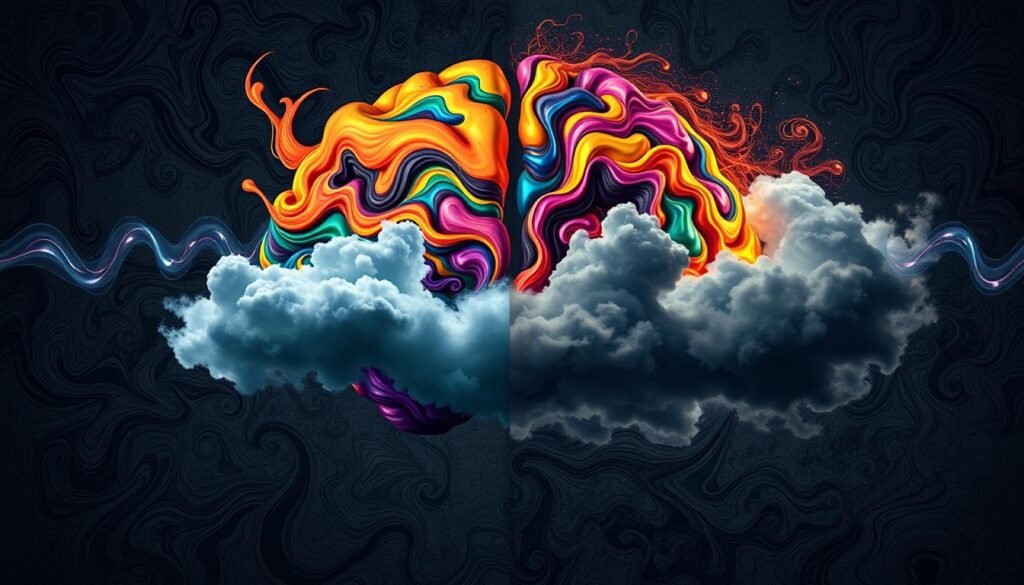Did you know children with ADHD or autism might face chronic fatigue by age 18? This fact shows a deep link between chronic fatigue and ADHD. It points out a big challenge for many. Fatigue in ADHD isn’t just short-lived. It’s a lasting issue that greatly impacts daily life and happiness.
People with ADHD often deal with increased energy drains. This is made worse by the anxiety and depression that often come with ADHD. It’s important to understand this link. It affects how people handle daily tasks. If not addressed, it can lead to burnout. ADHD can also disturb sleep patterns, adding to the fatigue challenge. Poor sleep and sensitivity to external stimuli make ADHD symptoms harder to manage.
In this article, we’ll look at symptoms of ADHD and chronic fatigue and their connection. We’ll also cover ways to manage these challenges to improve lives. Knowing how they interact is key to better health. It empowers those dealing with ADHD and chronic fatigue every day.
Key Takeaways
- Individuals with ADHD often experience higher levels of fatigue than neurotypical peers.
- Anxiety and depression can significantly impact energy levels for those with ADHD.
- External overstimulation may exacerbate fatigue, making daily tasks more difficult.
- Sleep disorders are common among individuals with ADHD, further complicating fatigue issues.
- Recovery from chronic fatigue is a gradual process, requiring targeted management strategies.
- Engagement in physical activities can help mitigate symptoms of fatigue.
- Support from professionals can aid in managing triggers and enhancing well-being.
Introduction to Chronic Fatigue and ADHD
Many with ADHD face the challenge of feeling constantly tired. Studies show fatigue is common in people with this condition. This fatigue makes everyday activities hard to manage.
ADHD comes with complex issues, including chronic fatigue. Problems like poor sleep, anxiety, and other disorders make this worse. Adults with ADHD have lower levels of certain chemicals which may increase tiredness. Those with the inattentive type often sleep poorly, leading to more intense fatigue.
It’s vital to manage these fatigue issues well. Adults with ADHD are especially prone to exhaustion and burnout. Knowing how chronic fatigue and ADHD are linked can improve life quality. Tools for organizing and coping strategies can ease the burden of fatigue. These steps make it simpler to handle daily tasks and stay mentally healthy.
The Symptoms of ADHD and Chronic Fatigue
People with ADHD face many challenges that affect their daily life. It’s important to recognize ADHD symptoms as they often lead to trouble with focusing. These issues can make someone feel frustrated and overwhelmed.
Understanding ADHD Symptoms
ADHD symptoms include having a hard time paying attention, being impulsive, and being disorganized. These issues can make mental fatigue worse, especially with complex tasks or responsibilities. If someone has trouble focusing, even simple tasks can seem too hard. This leads to more fatigue because they have to work harder to concentrate.
Mental Fatigue and Cognitive Impairment
Mental fatigue is common in people with ADHD and can affect thinking abilities. This means they might forget things, have trouble concentrating, and face challenges in completing tasks. There’s a link between ADHD symptoms and chronic fatigue when it gets harder to stay organized or focused. Factors like sleep problems, medication effects, and the continuous effort to manage focus can cause fatigue. Recognizing and dealing with these symptoms is key to improving life quality.
| ADHD Symptoms | Impact on Cognitive Function |
|---|---|
| Difficulties with sustained attention | Leads to increased mental fatigue and distractibility |
| Impulsivity | Results in challenges with organization and planning |
| Disorganization | Impacts daily activities and task completion |
| Hyperactivity | Can lead to trouble winding down, affecting sleep quality |
Exploring the Connection Between Chronic Fatigue and ADHD
The link between chronic fatigue syndrome and ADHD is complex, with overlapping symptoms and challenges. Those dealing with both conditions face many obstacles every day.
Common Experiences Among ADHD Individuals
Individuals with ADHD often deal with fatigue. This impacts their everyday life significantly. They experience ongoing mental exhaustion, irritability, and trouble sleeping. This is due to constant concentration struggles. These struggles lead to extreme tiredness as they fight off distractions. Trying to meet society’s expectations makes neurodivergent challenges harder. This causes a cycle of fatigue and disinterest.
The Role of Central Fatigue Syndrome
Central fatigue syndrome (CFS) is key in linking fatigue and ADHD. Those with ADHD might have chronic fatigue symptoms, making it hard to diagnose and help them. Studies show that adults with both conditions may need lots of sleep, like twelve hours, and still feel tired. This shows the need to understand the neurobiological aspects involved. For instance, high elevated levels of interleukin-6 tie ADHD symptoms to chronic fatigue. Managing energy carefully can help ease the difficulties of fatigue and ADHD. Learning to pace themselves and taking breaks can improve life quality for those affected. For tips on managing chronic fatigue, you can read more at effective strategies.
Why Does Chronic Fatigue Occur in ADHD?
Many people with ADHD feel very tired a lot. This is because ADHD is complex. Hyperactivity and getting distracted can use up a lot of energy. Doing daily tasks becomes very hard. Trying to stay focused and avoid distractions leads to feeling tired in the mind and emotions.
The Impact of Hyperactivity and Distraction
Being hyper and getting distracted a lot are big reasons why people with ADHD feel tired. They have to try hard to stay focused, while also dealing with impulsive actions and restlessness. This leads to ADHD fatigue factors, such as:
- Decreased productivity
- Frequent forgetfulness
- Lack of focus
- Poor emotional regulation
Even without stress, this mental tiredness can happen. It shows how tough it is to cope with ADHD. Research says ADHD might cause the brain to work differently, making people feel more tired. Hyperactivity and tiredness are strongly linked, especially when it lowers the quality of life.
Co-occurring Disorders and Medication Effects
Other issues like anxiety and depression can make ADHD tiredness worse. Many with ADHD also deal with these problems, adding more tiredness. Around 44% of people with ADHD have insomnia, making ADHD symptoms and tiredness worse. Medicines for ADHD can help but sometimes they also make people feel tired, making treatment harder.

The ADHD Brain and Its Unique Characteristics
The ADHD brain has unique features that change how it works. Studies have found that imbalances of certain brain chemicals, like dopamine and serotonin, are a big part of the condition. These imbalances make it hard for people with ADHD to stay focused and handle everyday tasks, leading to constant tiredness. Knowing about these biological aspects helps us understand the challenges that come with ADHD.
Neurological Differences in ADHD
ADHD brains are structurally different, affecting how someone thinks and acts. Research points out that certain brain areas, especially those involving attention and self-control, might develop in unique ways in those with ADHD. This leads to difficulties in staying on task, organizing, and using time well. People with ADHD often feel more tired because they have to work harder to deal with these brain differences.
How Brain Fog Affects Daily Functioning
Brain fog is common in individuals with ADHD and makes daily tasks harder. It causes problems like getting easily distracted, trouble organizing thoughts, and forgetting things, which makes it hard to get things done. This mental fog can also make you feel very tired and not good enough. It’s important to find ways to deal with brain fog to feel clearer and improve your life. For tips on handling the tiredness that comes with ADHD, you can look into ways to manage ADHD-related fatigue.
Management Strategies for Chronic Fatigue in ADHD
Dealing with chronic fatigue in people with ADHD calls for a varied approach. This approach should focus on managing activities, improving sleep, eating right for ADHD, and using planning tools. These steps can make a big difference in overall health and managing daily tasks.
Pacing and Structuring Daily Activities
Pacing activities is key in managing ADHD. It’s important to know your limits in physical and mental tasks. Keeping an eye on how much you do helps prevent sudden fatigue.
Even tasks that seem easy can cause tiredness if you don’t rest enough. Making a daily plan helps you balance work and rest. This method helps lessen feelings of being overloaded.
Importance of Sleep and Nutrition
Sleep plays a huge role in managing ADHD. Bad sleep can make fatigue issues worse. Good sleep habits, like a regular bedtime, cutting screen time before sleeping, and a comfortable sleep space, can improve sleep quality.
Nutrition is also crucial for energy control. Eating right helps keep energy stable all day. Focus on whole foods and cut down on sugar and processed items to boost concentration and fight off tiredness.
Utilizing Tools and Resources for Better Organization
Tools and resources help a lot with organizing for people with ADHD. Many apps and planners are made to help plan your day. Using reminders, checklists, and calendar apps make tasks simpler. This aids in managing how much you remember, a big challenge in ADHD.
These tools offer a clear outline of what needs to be done daily. In turn, this helps manage energy and cuts down on chronic fatigue.

Understanding Emotional Factors Contributing to Fatigue
Emotional health is key for people with ADHD. Anxiety and depression can make mental health and fatigue worse. Knowing about these issues helps in dealing with chronic fatigue.
Addressing Anxiety and Depression
Anxiety and depression often go along with ADHD, making tiredness worse. Anxiety causes worry, which makes it hard to relax. This can lead to ongoing tiredness. Depression makes energy levels drop, stopping people from doing things they like. It’s crucial to manage these to beat the fatigue cycle.
The Effects of Overstimulation and Sensory Processing Issues
Overstimulation is a big issue for those with ADHD. They may find normal senses too much, causing more anxiety and tiredness. This can make them feel upset and frustrated, turning daily tasks into huge challenges. Finding ways to handle overstimulation can lessen the fatigue from ADHD.
| Emotional Factors | Impact on Fatigue | Management Strategies |
|---|---|---|
| Anxiety | Increases mental strain and contributes to exhaustion | Cognitive-behavioral therapy, mindfulness exercises |
| Depression | Reduces energy levels and engagement in activities | Professional counseling, medication (if necessary) |
| Overstimulation | Heightens feelings of overwhelm and irritability | Creating quiet spaces, sensory breaks |
| Sensory Processing Issues | Contributes to emotional distress and fatigue | Occupational therapy, structured routines |
Chronic Fatigue and ADHD: Long-term Implications
Chronic fatigue can have severe long-term effects, especially for those with ADHD. Not treating chronic fatigue poses big risks. It affects mental health and overall happiness. Many studies show a strong link between untreated chronic fatigue and ADHD issues. This highlights the need for awareness and action.
Risks of Untreated Chronic Fatigue
Not recognizing the signs of untreated chronic fatigue can lead to serious problems. The risks include:
- Increased mental health issues: The risk of anxiety and depression grows if fatigue lasts long, making ADHD symptoms worse.
- Higher burnout rates: Long-lasting fatigue can cause emotional and physical exhaustion. This greatly lowers motivation and efficiency.
- Decline in daily life performance: Performing everyday tasks becomes harder, from job duties to keeping up relationships. This starts a cycle of more frustration and stress.
Burnout and its Impact on Daily Life
Burnout from fatigue is common in those with untreated chronic fatigue. It leads to:
- Productivity: It gets harder to fulfill work requirements, causing missed work or poor performance.
- Relationships: Fatigue makes it difficult to connect with others, hurting friendships and family bonds.
- Quality of life: Joy and satisfaction in life drop, as chronic fatigue stops one from doing favorite activities.

Knowing the long-term effects helps us deal with chronic fatigue better. Recognizing its impact and getting help allows for a better daily life. This reduces burnout risks and improves life quality.
Personal Narratives and Insights
Personal stories give us a deep look into the lives of people dealing with ADHD and chronic fatigue. Adults share their challenges, revealing how symptoms affect their daily routines. A 38-year-old woman talks about being diagnosed late with ADHD. She opens up about the stigma around it. Struggling with forgetfulness and tiredness, she shows what many facing late diagnoses go through.
Real-Life Experiences with ADHD and Fatigue
Individuals use their stories to explain ADHD beyond just childhood issues. They talk about strategies like body doubling and doodling, helping with fatigue and focus. Many face shame and the pressure of meeting societal expectations. Women, in particular, deal with unnoticed hyperactivity, leading to burnout. These stories underline the need to see the emotional pain of those with ADHD.
The Importance of Support Systems
Having a strong support network is key in dealing with fatigue combined with ADHD. Support from family, friends, and professionals is essential. Being part of a community that understands ADHD is also crucial. Sharing their stories, many find personal growth and empowerment. These stories push for more conversations about ADHD, promoting a culture that accepts neurodiversity.
| Key Themes | Description |
|---|---|
| Challenges | Feelings of shame, exhaustion from masking symptoms, societal expectations. |
| Coping Strategies | Body doubling, doodling to help with focus, self-discovery. |
| Support Systems | Importance of family, friends, and community networks in managing ADHD. |
| Awareness and Growth | Sharing experiences leads to greater understanding and acceptance. |
| Positive Aspects | Creativity, intuition, and unique problem-solving skills associated with ADHD. |
More research into adults with ADHD and their path to acceptance is out there. For deeper understanding, check out this article.
Conclusion
The link between long-lasting tiredness and ADHD is getting more attention. It shows the struggles of those living with these issues. Research points out that ADHD is often found with chronic fatigue, affecting about 15% of people. Knowing more about this can help people find better ways to handle their situation.
To tackle chronic tiredness and ADHD, a well-rounded plan is key. It should include better sleep habits, exercise, and eating well. This approach is very important for dealing with ADHD tiredness. For those looking into natural options, natural remedies for adrenal fatigue can be a good source.
It’s important to see how symptoms and their causes affect each other. Having a whole view and getting support can help manage chronic tiredness and ADHD. This way, people can work towards leading happier lives.